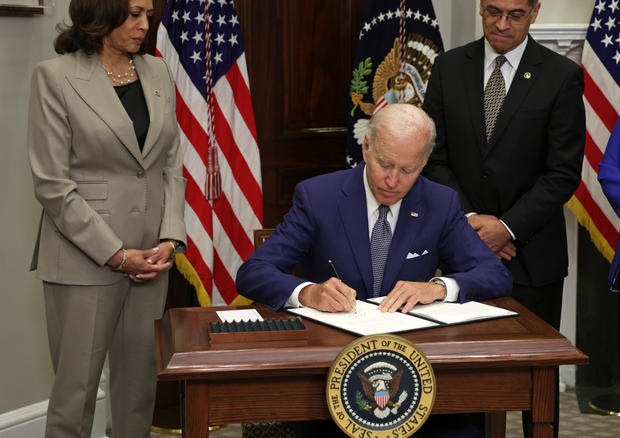President Biden signed an executive order Friday aimed at protecting access to abortion, as he faces mounting pressure from fellow Democrats to be more forceful on the subject after the Supreme Court ended a constitutional right to the procedure two weeks ago. The president blasted the court’s decision, and urged Americans to vote for candidates in November who support abortion rights legislation.
“This was not a decision driven by the Constitution, and despite what those justices in the majority said, this was not a decision driven by history,” Mr. Biden said at the White House Friday, flanked by Vice President Kamala Harris and Health and Human Services Secretary Xavier Becerra.
The actions the president outlined Friday are intended to try to mitigate some potential penalties women seeking abortion may face after the ruling but are limited in their ability to safeguard access to abortion nationwide.
Specifically, the executive order asks the Justice Department to do everything within its power to protect women seeking abortion, including protecting women’s right to travel to another state for an abortion and to protect access to Food and Drug Administration-approved abortion drugs. The order also directs the Health and Human Services Department to ensure all women and girls experiencing pregnancy loss receive the emergency care they need, no matter what state they’re in. The executive order also protects access to contraception and expands access to free contraception, Mr. Biden said.
“Consider the challenge accepted,” he said, addressing the high court. “But in the meantime, I’m signing this important executive order.”
Getty Images
The executive order also directs agencies to work to educate medical providers and insurers about how and when they are required to share privileged patient information with authorities — an effort to protect women who seek or utilize abortion services. It also asks the Federal Trade Commission to take steps to protect the data privacy of those seeking information about abortion and other reproductive services online. Mr. Biden insisted the right to privacy is “embedded” in the Constitution.
“This decision affects everyone, unrelated to choice, beyond choice,” Mr. Biden told the country. “We cannot allow an out-of-control Supreme Court, working in conjunction with extremist elements of the Republican Party, to take away freedoms and our personal autonomy.”
On Friday, Mr. Biden urged people, particularly women, to vote in November, saying the “fastest way” to restore Roe begins at the ballot box.
“We need two additional pro-choice senators and a pro-choice House to codify Roe as federal law,” the president said. Your vote can make that a reality.”
The White House has said the administration will also convene volunteer lawyers to provide women and providers with pro bono legal assistance to help them navigate new state restrictions after the Supreme Court ruling.
The order, which he signed weeks after the high court’s June 24 ruling that ended the nationwide right to abortion and left it to states to determine whether or how to allow the procedure, comes as Mr. Biden faces criticism from some in his own party for not acting with more urgency to protect women’s access to abortion. The decision in the case known as Dobbs v. Jackson Women’s Health Organization overturned the court’s landmark 1973 Roe v. Wade ruling.
Since the decision, Mr. Biden has stressed that his ability to protect abortion rights by executive action is limited without congressional action.
“Ultimately, Congress is going to have to act to codify Roe into federal law,” Mr. Biden said last week during a virtual meeting with Democratic governors.
The tasking to the Justice Department and HHS is expected to push the agencies to fight in court to protect women, but it conveys no guarantees that the judicial system will take their side against potential prosecution by states that have moved to outlaw abortion.
